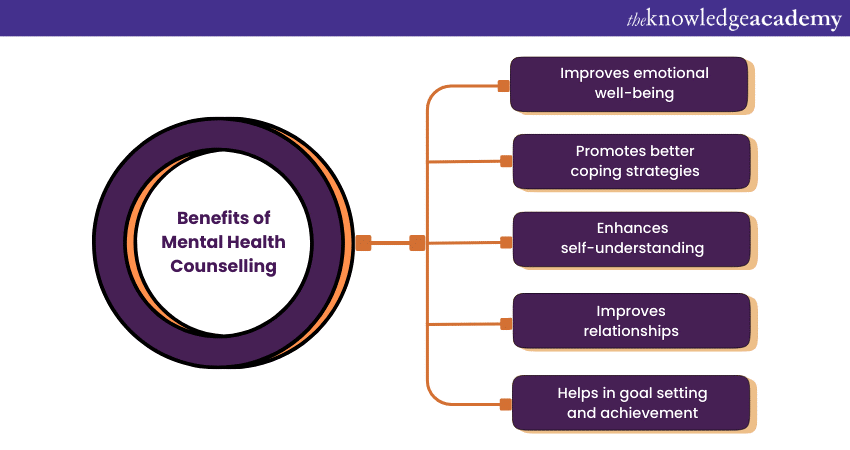About Mental Health Counseling
Table of ContentsThe Facts About Mental Health Counseling UncoveredThe Greatest Guide To Mental Health CounselingHow Mental Health Counseling can Save You Time, Stress, and Money.Mental Health Counseling Fundamentals ExplainedThe 10-Minute Rule for Mental Health Counseling
With therapy, you can acquire insight into your own patterns of actions and interaction, which can lead to even more meeting and pleasing connections with close friends, family, and enchanting companions. What we assume, we manifest. If you're consumed with adverse feelings and unfavorable thoughts that are hindering your life, therapy can aid.Like our ideas, occasionally our actions come to be destructive. They can maintain us from living a positive and healthy way of living. Possibly you have problem with dependency, or you have a tendency to self-sabotage, or there are other adverse methods you behave. Mental Health Counseling. Therapy can help you alter those behaviors that are having a negative impact on your world and relationships.

Obtaining therapy to resolve specific facets of your life can help you be extra efficient in various other areas, including work.

Get This Report about Mental Health Counseling
You can see a specialist when points are going actually well in your life, or when you're about to go through a huge life shift." Talkspace specialist Kate Rosenblatt, MA, LPC, LMHC. There are also much more benefits of therapy than just the ones we have actually discussed. Therapy can instruct you exactly how to take care of separation, take care of pain, or construct relationships (romantic or those with friend or family) in a healthy way.
For the objective of the existing research study, viewed benefits and obstacles to psychological wellness help-seeking are being discovered. Previous research found that perceived obstacles have a substantial result on university student' health actions options (Von Ah, Ebert, Ngamvitroj, Park & Kang, 2003). Perceived advantages and obstacles to help-seeking were particularly chosen due to their impact on decision-making and eventually action (Glanz, Rimer, & Su, 2005).
Today research looks for to analyze whether stigma serves as a barrier to treatment amongst university student. Eisenberg et al. (2011) recommended that skepticism about treatment efficacy is an additional obstacle to participating in treatment. Research searchings for exposed that university student backed numerous barriers to taking part in treatment. Mental Health Counseling. Amongst these were: (1) choosing to manage mental illness themselves, (2) not having adequate time to take part in therapy, (3) questions regarding whether psychological health therapy works in remediating issues, (4) an idea that tension is regular or the problem will obtain better without treatment, (5) absence of money, and (6) bother with what others would certainly believe if they discovered therapy involvement.
Personnel in school mental health facilities might be viewed as unfriendly, and long wait times for services may be "repulsive" for pupils. Variables promoting extra favorable attitudes are frequently at the opposite post of those aspects determined as barriers.
The Facts About Mental Health Counseling Revealed
One in three (34.6%) i was reading this reported surviving school and one in 4 (23.3%) reported dealing with moms and dads. Almost fifty percent of students were associated with school companies and 1 in 10 reported being in a society or sorority. Greater than one-third of trainees (38.1%) reported that they had a relative or friend with a detected mental wellness condition.

See This Report about Mental Health Counseling
Univariate F-tests determined certain subscale things that significantly differed. Females were less likely than males to perceive individuals who go to therapy as psychologically weak, individuals who most likely to therapy as insane, to really feel that people with psychological illness should deal with problems on their very own, that individuals that go to therapy as not able to address troubles, that individuals that most likely to counseling are careless, and to really feel that individuals who most likely to therapy are different from normal people in an adverse means.
Similarly, research results exposed that females were dramatically less most likely than males to hold stigma-related perspectives. This follows previous research study which additionally discovered that men hold higher levels of regarded preconception than females (Chandra & Minkovitz, 2006). Based upon study findings, it appears that males may be much less likely than women to look for therapy due to reduced regarded barriers in addition to high stigma-related perspectives.
The Ultimate Guide To Mental Health Counseling
In addition, university health and wellness experts may supply instructional programs targeting males with information on the advantages of psychological health and wellness treatment and the relevance of looking for help when required., the existing research study found no substantial differences in the number of perceived obstacles to help-seeking habits based on sex.
Researchers guess that click this is mainly description due to typical social norms and gender duties that characterized men based on toughness and absence of emotional expression (Addis & Mahalik, 2003; Ang, Lim, Tan, & Yau, 2004; Mojtabai, 2007). On the whole, there have been combined outcomes among the university student populace relating to sex distinctions (Rosenthal & Wilson, 2008). This finding was unanticipated and can highlight that those that had actually gotten therapy had a far better idea of delay times and various other "access" barriers that might make it tough to start treatment. Perhaps, individuals who have received therapy view more obstacles than participants that have not gotten therapy because looking for therapy services once again can include anxiety of self-disclosing personal info to a brand-new therapist.